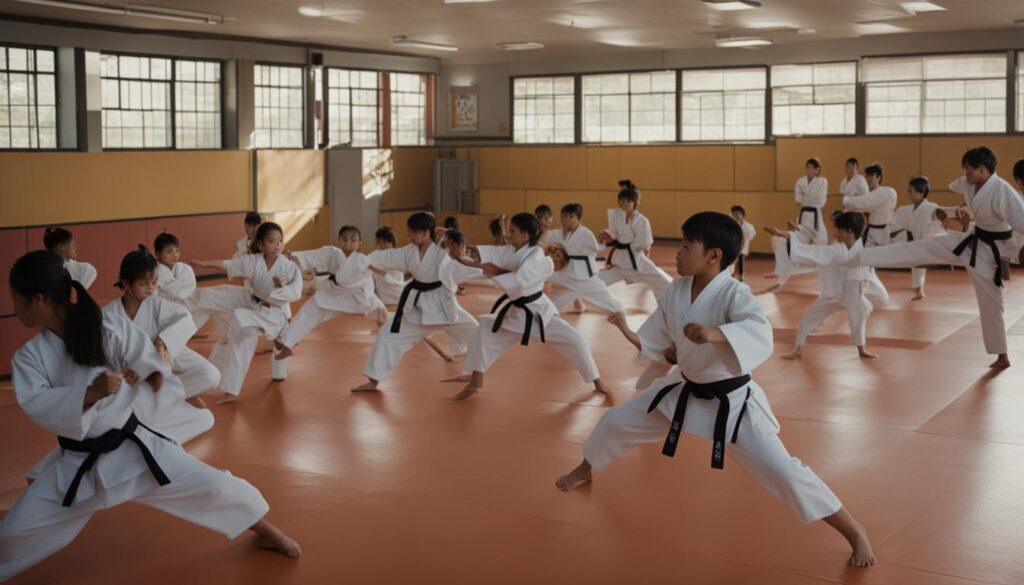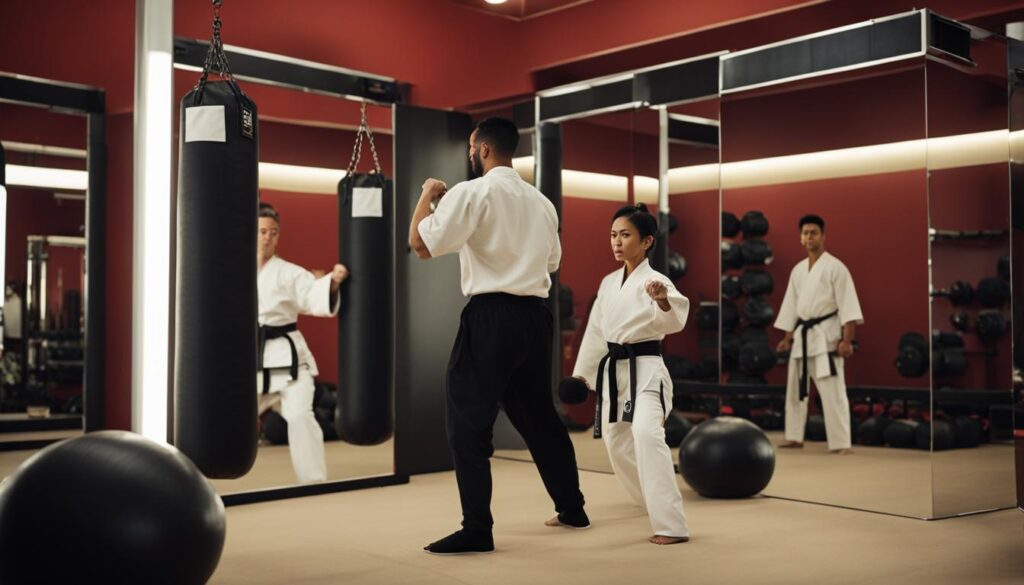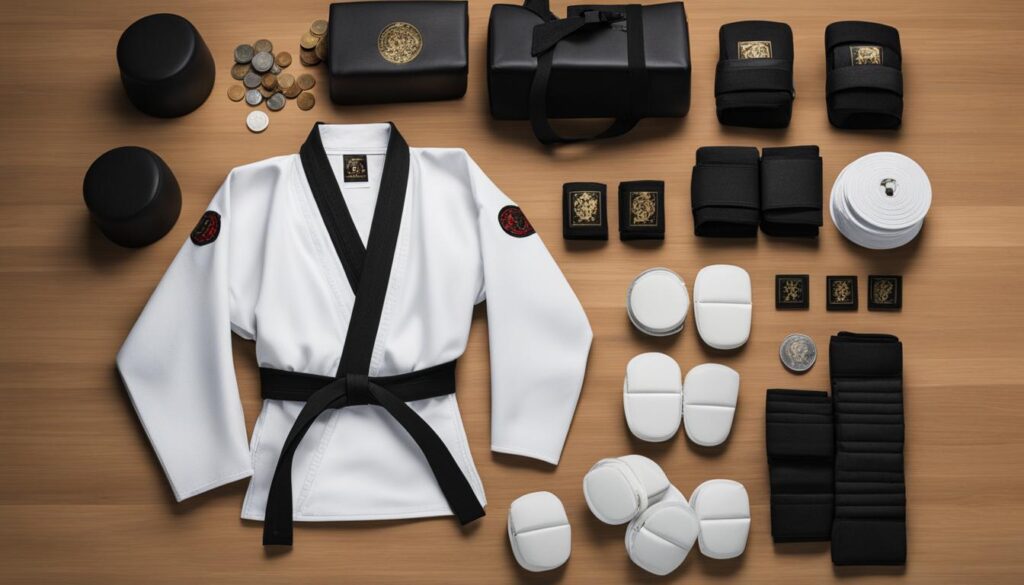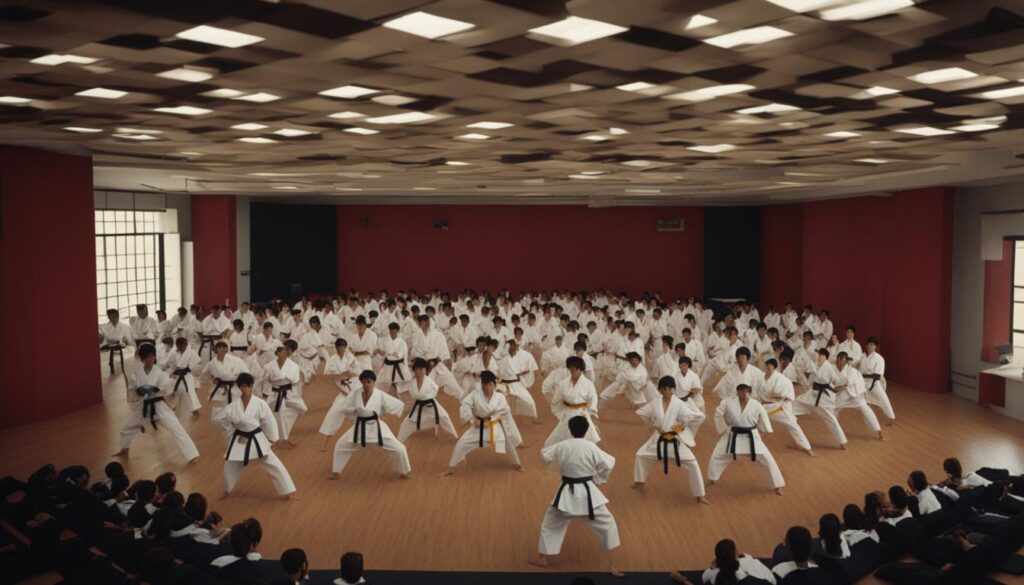Karate classes come with varying price ranges depending on several factors. If you are interested in joining a karate class, it’s important to understand the different costs involved. In this article, we will provide a breakdown of the average costs of karate classes and the various types of programs available.
Whether you are looking for affordable karate classes, want to know the pricing of karate lessons, or curious about the fees associated with karate instruction, we have got you covered. Understanding the cost structure will help you make an informed decision and find the right karate school for your needs.
Key Takeaways:
- Karate classes have varying costs depending on the type of program and level of training.
- Community programs offer the most affordable karate classes, often held in churches, community centers, or parks.
- Part-time schools provide quality training with more flexible schedules and payment options.
- Professional schools offer a premium training experience with additional classes and programs.
- Private training sessions provide personalized attention for accelerated skill development.
The Community Program – Affordable Karate Classes
In today’s society, participating in physical activities like karate is essential for personal well-being. However, high costs of martial arts training can often be a barrier for individuals and families seeking to learn this empowering discipline. Here’s where community programs come in.
Community programs offer the most affordable karate classes available, making it accessible to a wider range of individuals. These programs are often held in community centers, churches, and parks, providing flexibility in training venues. By utilizing these existing spaces, community programs can keep their overhead costs low, and the savings are passed on to the participants.
Community programs typically offer a range of pricing options to accommodate different financial situations. Some programs even provide free or highly subsidized classes to ensure that no one is excluded from learning karate due to financial constraints. The cost of these programs can range from as low as free to around $100 per month, depending on the location and level of instruction.
One of the key advantages of community programs is their informal membership structure. Unlike traditional martial arts schools, community programs often operate on a drop-in basis or offer short-term memberships. This flexibility allows individuals to participate without committing to long-term contracts or costly fees.
Payments for community programs are typically made in cash or check, providing a straightforward and hassle-free transaction process. This simplicity aligns with the community-focused nature of these programs, making the overall experience more accessible and comfortable for participants.
Moreover, community programs often extend preferential pricing or discounts for families, acknowledging the importance of making karate accessible to everyone in the community. This makes it highly affordable for families who want to engage in physical activities together and bond through shared experiences.
Community programs also foster a strong sense of camaraderie and support among participants. Training in a familiar community setting can create a welcoming and inclusive environment, helping individuals build valuable connections and a supportive network.
Overall, community programs offer a fantastic opportunity to learn karate at low-cost with abundant benefits. Let’s take a look at a table summarizing the key features and advantages of community programs:
| Features | Advantages |
|---|---|
| Low-cost karate classes | Accessible to a wide range of individuals |
| Flexible training venues | Utilization of community centers, churches, and parks |
| Informal memberships | No long-term contracts or costly fees |
| Favorable pricing for families | Engage in physical activities together at an affordable price |
| Welcoming and inclusive environment | Build valuable connections and a supportive network |
Whether you’re an individual seeking to learn karate or a family looking for a fun and affordable activity, community programs provide an excellent opportunity to engage in this dynamic martial art without breaking the bank. So why wait? Join a community program near you and embark on an exciting karate journey!
The Part-Time School – Quality Training with Flexibility
Part-time schools offer a fantastic option for individuals seeking quality martial arts training while considering their budget. These schools, often located in leased commercial spaces within strip malls, provide a convenient and accessible training atmosphere. Unlike community programs, part-time schools have regular schedules that allow students to attend classes consistently, maximizing their progress and improvement.
One of the advantages of part-time schools is the availability of dedicated instructors who specialize in martial arts instruction. These part-time instructors bring their expertise, passion, and commitment to ensuring that students receive top-notch training.
The flexibility of payment options adds to the appeal of part-time schools. With price ranges between $75 and $150 per month, individuals can choose from various membership types and payment plans that suit their financial needs. This flexibility enables students to enjoy a high-quality training experience without straining their wallets.

Overall, part-time schools are an excellent choice for individuals looking for a balance between exceptional training and flexible payment options. The professional instructors, regular schedules, and welcoming training atmosphere ensure a rewarding martial arts experience.
The Professional School – Premium Training Experience
For those seeking a premium martial arts training experience, professional schools are an excellent choice. These full-time martial arts schools provide robust schedules, larger facilities, and a professional staff dedicated to offering a comprehensive training program.
Professional schools pride themselves on their exceptional training environments, ensuring students receive top-notch instruction in state-of-the-art facilities. These schools often have additional classes and programs available, catering to various interests and goals. Whether you want to incorporate fitness kickboxing, yoga, or kettlebells into your training routine, professional schools have you covered.
Membership options at professional schools typically include contracts or month-to-month arrangements, providing flexibility for students. Expect prices at professional schools to range from $150 to $500 per month, depending on the location and level of instruction.
| Features | Benefits |
|---|---|
| Full-time operation | Consistent training schedules for optimal progress |
| Larger facilities | Spacious training areas for a comfortable learning experience |
| Professional staff | Experienced instructors committed to your success |
| Additional classes and programs | Opportunities to explore different martial arts disciplines |
Experience the epitome of martial arts training at a professional school and unlock your full potential.
Private Training Sessions – Personalized Attention
For individuals seeking personalized martial arts training and accelerated skill development, private training sessions offer one-on-one instruction tailored to their specific needs and goals. These sessions provide focused attention and guidance from experienced instructors, allowing students to progress at their own pace and receive personalized feedback.
Private training sessions are ideal for individuals who prefer individualized instruction or have specific training objectives in mind. Whether you’re a beginner looking to build a strong foundation or an advanced practitioner aiming to refine your techniques, private sessions can help you achieve your martial arts goals effectively.
The average cost for private one-hour sessions ranges between $50 and $80 per session. Keep in mind that fees may differ depending on the instructor’s level of expertise and the scope of individualized instruction required.
Benefits of Private Training Sessions:
- Personalized Attention: Receive individualized instruction and guidance to address your unique strengths, weaknesses, and goals.
- Accelerated Skill Development: Make faster progress by focusing on specific techniques and areas of improvement.
- Flexible Training: Schedule sessions at your convenience to fit your busy lifestyle.
“Private training sessions provide the opportunity for accelerated learning and skill development in martial arts. The personalized attention and tailored instruction can greatly enhance the student’s progress and understanding of the art.” – John Smith, Martial Arts Instructor
Private training sessions can be a cost-effective option for individuals seeking accelerated skill development. While the fees may be higher compared to group classes, the focused attention and personalized instruction can result in significant improvements in a shorter time frame.

Online Karate Programs – Learning at Your Convenience
Online karate programs offer the convenience of learning from the comfort of your own home. With virtual martial arts lessons, you can now train in karate through remote learning, saving you time and money. This option provides flexibility in scheduling and eliminates the need for travel, making it an ideal choice for those with busy lifestyles or limited access to local karate schools.
One of the major advantages of online karate training is its lower cost compared to in-person classes. These programs provide a more affordable option, with prices ranging from $33 to $41 per month. This is a considerable savings compared to traditional karate classes, which can cost upwards of $100 per month.
But affordability doesn’t mean compromising on quality. When choosing an online karate program, it’s essential to do your research and ensure that the instructor and program are of high quality. Look for programs that offer comprehensive training materials, clear instruction, and interactive elements to keep you engaged throughout your remote learning journey.
An effective way to find quality online programs is by reading reviews and testimonials from other students. Look for programs that have a track record of success and positive feedback. Additionally, consider reaching out to the instructor or program administrator to ask any questions you may have and gauge their level of expertise and responsiveness.
By finding a reputable online karate program, you can enjoy the convenience of learning at your own pace and on your own schedule, all while saving money compared to traditional in-person classes.
Check out the image below to get a visual representation of online karate training:
Pros and Cons of Online Karate Programs
| Pros | Cons |
|---|---|
| Convenient and flexible | No in-person interaction |
| Lower cost option | Potential for distractions at home |
| Access to quality instructors | Dependent on reliable internet connection |
| Learn at your own pace | Requires self-discipline and motivation |
Additional Costs – Uniforms, Belt Testing, and Equipment
When participating in karate training, there are additional costs to consider aside from the class fees. These include expenses for uniforms, belt testing, and necessary equipment. Let’s take a closer look at each of these elements.
Karate Uniform Cost
A karate uniform, also known as a gi, is an essential item for all karate practitioners. The cost of a karate uniform can vary depending on factors such as the quality of the fabric and the brand. On average, a karate uniform can range from $20 to $150. Experienced students may opt for higher-quality gis that offer better durability and comfort, while beginners may choose more affordable options.
Belt Testing Fees
In karate, the progression of skills is marked by different colored belts. Graduating to a higher belt level often requires passing a belt testing examination. Belt testing fees cover the costs associated with evaluating and awarding the new belt. These fees typically range from $40 to $150, depending on the school and the level of testing. It’s important to inquire about the specific fees and requirements with your karate school.
Cost of Karate Belts
As you move up in belt ranks, you will need to acquire new belts to reflect your progress. The cost of karate belts can vary, but they are usually included in the belt testing fees. The prices of belts themselves range from $10 to $30, depending on the quality and material. It’s common for schools to have a set price for belts at each level, but additional costs may apply if you require special embroidery or customization.
Karate Equipment Expenses
Aside from uniforms and belts, karate training may also require specific equipment for various activities. For example, if you plan to participate in sparring or kumite, you will need protective gear such as gloves, shin guards, a mouthguard, and a helmet. The cost of kumite equipment could be around $70, depending on the quality and brand. It’s crucial to invest in high-quality equipment to ensure safety and durability throughout your training.
By considering these additional costs, you can better plan for your karate journey and budget accordingly. Remember, while these expenses may add up, they are necessary investments in your progress and safety as a karate student.

Karate Belt – Symbol of Achievement
Karate belts are not just ordinary accessories; they hold deep significance in the world of martial arts. Each belt represents a milestone and symbolizes the progression and achievements of karate practitioners. The journey from a beginner to a black belt is marked by various belt levels, rigorous grading tests, and the acquisition of belt certificates. Let’s explore the importance and costs associated with karate belts.
Belt Grading Tests and Levels
Earning a higher belt level requires successfully completing grading tests, which assess the practitioner’s skills, techniques, knowledge, and dedication. These tests serve as benchmarks to determine if a student is ready to progress to the next level. The cost of each grading test typically includes the price of the new belt.
There are different belt levels in karate, starting from white and progressing through colors such as yellow, orange, green, blue, purple, brown, and finally, black belt. Each belt level represents an increased expertise and mastery of karate techniques.
Karate Belt Cost and Black Belt Price
The cost of a karate belt is usually incorporated into the price of the grading test. The fees for grading tests vary depending on the belt level and the specific karate school. On average, grading test fees can range from $40 to $150 per test.
As the pinnacle of achievement in karate, a black belt is highly revered. The price of a black belt can differ based on factors such as its origin and craftsmanship. An authentic high-grade black belt imported from Okinawa, Japan, can cost between $150 to $200 as a one-time purchase.
Belt Certificates – Commemorating Accomplishments
Alongside the physical belt, practitioners also receive belt certificates upon successful completion of grading tests. These certificates serve as official documentation of the individual’s achievements, acknowledging their dedication and progress in karate training.
Karate Belt Levels and Average Grading Test Costs
| Belt Level | Average Grading Test Cost |
|---|---|
| White Belt | $40 – $60 |
| Yellow Belt | $50 – $70 |
| Orange Belt | $60 – $80 |
| Green Belt | $70 – $90 |
| Blue Belt | $80 – $100 |
| Purple Belt | $90 – $110 |
| Brown Belt | $100 – $120 |
| Black Belt | $120 – $150 |
Hidden Fees and Insurance
When considering karate training, it’s important to be aware of any hidden fees that may arise. These fees can add up and impact your overall budget. One common hidden fee in karate is insurance for students training in-person. Dojos often require students to have insurance coverage to protect against potential injuries during training.
While most karate schools are transparent about their pricing, it’s always recommended to ask for clarity and transparency from the instructor before committing financially.
By understanding and addressing potential hidden fees, you can ensure that there are no surprises down the line and make an informed decision about the cost of your karate training.

Insurance Coverage for Karate Students
In karate, insurance coverage plays a crucial role in protecting students and instructors alike. While the pricing for insurance can vary, it is essential to factor it into your overall budget. Insurance coverage typically includes liability coverage in case of injuries or accidents during training sessions. The cost may vary depending on the level of coverage and the number of students covered.
| Insurance Coverage | Price Range |
|---|---|
| Basic Coverage | $50 – $100 per year |
| Comprehensive Coverage | $100 – $200 per year |
It is crucial to discuss insurance coverage with your instructor or the school administration to fully understand the costs and benefits. Transparency in pricing and insurance coverage ensures that you have adequate protection and peace of mind while training.
Other Potential Hidden Fees
In addition to insurance, there may be other hidden fees associated with karate training. These can include registration fees, administrative fees, equipment fees, or additional charges for events or competitions. It’s important to inquire about these fees upfront and factor them into your budget to avoid any financial surprises.
Remember, transparency in pricing is key when choosing a karate school. Open communication with instructors and school administrators will help you make an informed decision about the total cost of your karate training.
Choosing the Right Karate School – Quality Over Price
When it comes to choosing a karate school, the focus should always be on quality over price. Selecting the right school is crucial for your martial arts journey and overall experience. Here are some essential factors to consider:
Instructor Qualifications
The qualifications of the instructors play a fundamental role in the quality of instruction you will receive. Look for instructors who have extensive experience and relevant certifications in the style of karate you wish to learn. A well-trained instructor can guide you effectively and ensure you develop proper techniques.
Student Experience
Prioritize schools that emphasize the overall student experience. A good karate school should provide a positive and supportive environment, fostering a sense of community among students. Consider visiting the school, observing classes, and speaking with current students to gauge their level of satisfaction and enthusiasm.
Training Environment
The training environment is another critical aspect to evaluate. A clean and well-maintained facility with ample space for training promotes safety and enhances the learning experience. Pay attention to how the classes are structured and if the training methods align with your goals and preferences.
Trial Classes
Many reputable karate schools offer trial classes to prospective students. Take advantage of these opportunities to experience the teaching style and atmosphere of the school firsthand. Attending trial classes will help you determine if the school is the right fit for you before making a long-term commitment.
Remember, the true value of a karate school lies in the quality of instruction, student experience, and training environment. By prioritizing these factors, you can find a school that aligns with your goals and provides a rewarding and enriching learning experience.
| Factors to Consider | Quality of Instruction | Student Experience | Training Environment | Trial Classes |
|---|---|---|---|---|
| Qualified instructors | Experienced and certified | Positive and supportive | Clean and well-maintained | Opportunities to experience |
| Student-focused approach | Effective teaching methods | Satisfied and engaged students | Ample space for training | Determine the right fit |
| Aligned with goals | Helping students progress | Enriching learning experience | Safe and conducive to growth | Before long-term commitment |
Conclusion
When considering karate training, it’s important to weigh the various costs involved. The price of karate classes can vary depending on factors such as the type of program and the level of training. However, affordability should not be the sole determining factor in your decision.
Finding the right school is crucial to ensure a rewarding experience. Thorough research and visiting different schools can help you make an informed choice. Pay attention to the quality of instruction, the student experience, and the overall training environment.
Personal preference also plays a significant role. Each school has its own unique approach and teaching style. It’s essential to find a school that aligns with your goals and values.
A commitment to quality is paramount in your karate journey. While cost is an aspect to consider, prioritizing quality instruction, a positive student experience, and your personal preference will help you make the best decision. Ultimately, investing in a karate school that meets your needs will contribute to your growth and development in the martial arts.
FAQ
How much do karate classes typically cost?
The cost of karate classes varies depending on the type of program and level of training. Community programs can range from free to around $100 per month, part-time schools range from $75 to $150 per month, and professional schools range from $150 to $500 per month. Private training sessions cost between $50 and $80 per session, and online karate programs range from $33 to $41 per month.
What are community karate programs, and how much do they cost?
Community programs are held in churches, community centers, or parks and offer affordable karate classes. Prices can range from free to around $100 per month, with discounts for families. These programs have lower overhead costs and often have flexible membership options.
What are part-time karate schools, and what are their prices?
Part-time schools are located in commercial spaces in strip malls and offer a balance of quality training and budget considerations. Prices for part-time schools range from $75 to $150 per month. These schools typically have more regular schedules compared to community programs and offer different membership types and payment plans.
What are professional karate schools, and how much do they cost?
Professional schools provide a premium training experience with full-time operation and larger facilities. Prices for professional schools range from $150 to $500 per month. These schools often offer additional classes and programs like fitness kickboxing, yoga, or kettlebells.
How much do private karate training sessions cost?
Private one-hour sessions cost between $50 and $80 per session, with higher fees for individualized instruction. These sessions offer personalized attention and focused skill development, making them a cost-effective way to progress faster in martial arts training.
How much do online karate programs cost?
Online karate programs offer the convenience of learning from home and are significantly cheaper compared to in-person classes. Prices for online training range from $33 to $41 per month. However, it’s important to ensure the instructor and program are of high quality before committing to online training.
What are the additional costs in karate training?
Additional costs in karate training include uniforms, belt testing fees, and equipment. The cost of a karate uniform, or gi, can range from $20 to $150. Belt testing fees typically range from $40 to $150, and the cost of belts themselves can vary. Kumite equipment for sparring may cost around $70.
How much do karate belts cost?
The cost of a karate belt is usually included in the price of the grading test, which can range from $40 to $150 depending on the belt level. A high-grade black belt from Okinawa, Japan can cost between $150 to $200 as a one-time purchase.
Are there any hidden fees in karate training?
While most karate dojos are transparent about their costs, it’s important to be aware of any hidden fees, such as insurance charges for students training in-person. It’s always recommended to ask for transparency from the instructor before committing financially.
What factors should I consider when choosing a karate school?
When choosing a karate school, it’s essential to prioritize quality over price. Factors to consider include the instructor’s qualifications, the student experience, the training environment, and available trial classes. It’s important to find a school that aligns with your goals and provides a positive learning experience.
